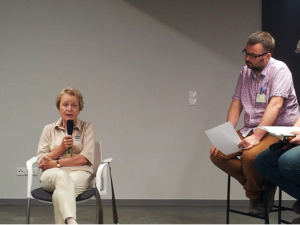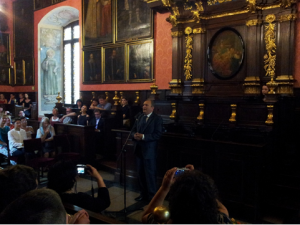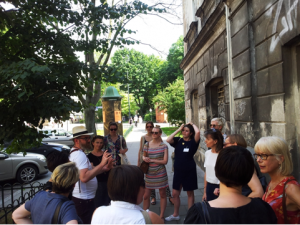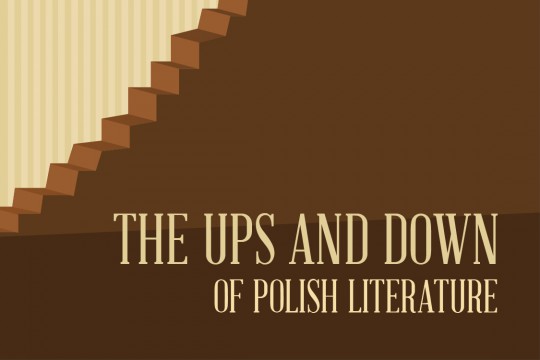In March 2017, Poland will be The London Book Fair’s Market Focus. The small but passionate group of experts involved in making Polish books available to English readers has been working harder than usual to prepare. What better way to lay the groundwork than to gather those experts, give them space to talk, and learn about great Polish books while meeting UK publishers?
This is what the Book Institute in Kraków did during a few intense days in June 2016. I was honoured to join a group of translators, editors, publishers and rights experts as we celebrated Polish literature, translation, and—as Babel literary festival put it—linguistic hospitality. On top of meetings with authors and presentations by experts, we had time to see some of sweltering Kraków, peek into bookshops and enjoy golf cart rides. The hospitality and professionalism of the Book Institute’s staff were outstanding.
The packed programme included six presentations by specialists—each of them chose ten best books in their category (contemporary fiction, essays, modern classics, literary reportage, crime and mystery, and all-time best Polish novels). Two talks stood out for me: contemporary fiction by Magdalena Miecznicka and reportage by Piotr Mitzner. They introduced us to a range of diverse voices and cannily chose books that could appeal to a foreign publisher. Magdalena talked about, among others, Anna Janko’s devastating but poetic non-fiction book Mała Zagłada (A Minor Extermination) about war trauma passed down the generations; Olga Tokarczuk’s rich tapestry of a novel, Księgi Jakubowe (The Books of Jacob), portraying a bygone, multicultural Poland; Patrycja Pustkowiak and Justyna Bargielska’s uncompromising feminist perspectives; and Michał Witkowski’s picaresque, queer tale Funf und Cfancyś. My highlights of Mitzner’s talk were: Karolina Domagalska’s Nie przeproszę, że urodziłam (I Won’t Apologise for Giving Birth) about IVF—for which, incidentally, there is no longer any government funding in Poland, as of this year—and Jarosław Mikołajewski’s Wielki przypływ (The Great Influx), a lyrical, minimalist report from Lampedusa, a tiny Mediterranean island which has become a stopover for hundreds of thousands of refugees.
We also had four author meetings: with Szczepan Twardoch (historical fiction), Jacek Dukaj (speculative fiction), Małgorzata Szejnert (reportage and non-fiction) and Elżbieta Cherezińska (historical fiction again). Out of those four, the one I found most interesting is Szejnert, the eighty-year-old doyenne of reportage, winner of many literary prizes and author of ten books, among them Key Island about Ellis Island and Black Garden. The latter has sentimental value for me—in it Szejnert compiles a rich, lively biography of my home region, Silesia. Located in the South of Poland, it was once a thriving coal mining centre and, burdened with a history of political and social unrest, is now looking for a new identity. Szejnert has honed her craft during decades of editorial and managerial work. Her brand of journalism is founded firmly on curiosity which can only be sated by a personal visit to the region she is interested in—using the Internet as only one of her many tools.

Małgorzata Szejnert talking to Tomasz Pindel.
Every year, the Institute awards the Transatlantyk Award to an outstanding ambassador of Polish literature. Our group took part in the ceremony held in the ornate hall of Collegium Maius. In 2016 the prize went to Constantin Geambaşu, an eminent scholar and translator of dozens of Polish books into Romanian. I was staggered by Professor Geambaşu’s range: it seems like in the course of his long career he has translated every prominent Polish writer from the Renaissance poet Jan Kochanowski to 33-year-old contemporary novelist and playwright Dorota Masłowska. It was touching to see such a well-deserved honour being received so humbly, and to be reminded that translation into English is only one of the many ways texts can travel. I have promised myself to learn more about the circulation of texts within Eastern Europe. Geography, history and politics have frequently meant shared experiences for the various countries in the region, but it doesn’t feel like translations between the more local languages (which can help to bring us closer to our neighbours) are celebrated in quite the same way as translations into the “big” languages—although those, of course, can potentially hugely increase a book’s audience..

Professor Constantin Geambaşu accepting the Transatlantyk Award.
A guided walk through Kraków historical Jewish district, Kazimierz, was an opportunity to stretch our legs. We browsed at the Lokator bookshop, where many Polish books caught my eye with their fantastic design and—on closer inspection—content. It was a pleasure to see that excellent publishing houses such as Czarne, Karakter and a few others keep up a steady output of books with a truly international appeal. I was intrigued by Filip Springer’s Księga zachwytów (A Book of Delights), a hefty, subjective guide to Polish architecture. (You will soon be able to read Springer’s historical non-fiction book Miedzianka in Sean Bye’s translation). Then we visited Massolit—Kraków’s answer to Shakespeare and Company, only bigger and with a slightly more academic tinge. It is a bookshop with a cult following, and a must-see for any bookworm visiting Kraków.

The seminar group wandering around Kazimierz.
The seminar was also interesting from a political perspective. After the elections in October last year the Polish government, now led by the right-wing Law and Justice party, started replacing civil servants. In April, the management of the Book Institute went from Grzegorz Gauden to Dariusz Jaworski. Since then, the Polish press has published a few reports about the changes effected which, along with some last-minute changes in the programme of the seminar, convey an increased interest in promoting literature about Polish history and a revival of a conservative Polish canon. Journalist and literary critic Justyna Sobolewska pointed out that the results of this year’s edition of Copyright Poland—a programme that funds translations from Polish—still have not been posted (the programme itself is now being restructured), while Lithuanian translator Vyturys Jarutis has reportedly been denied funding for his work on Runners by Olga Tokarczuk, who is, in some circles, considered to be anti-Polish. Tomasz Pindel, excellent translator from Spanish into Polish and one of the organisers of the seminar, has since resigned from his position at the Institute, quoting “far-reaching changes in the Institute’s philosophy”.
The Polish Market Focus at the London Book Fair next year will be a unique opportunity to acquaint foreign publishers with the relatively undiscovered literature of this conflicted, yet creative nation—and for many years, the Institute has been instrumental in promoting it. As a Polish translator, I will be interested to see now whether political decisions do not overshadow considerations of artistic worth and universal—or, indeed, commercial—appeal.
Marta Dziurosz is a London-based Polish <> English translator and interpreter and Free Word’s translator-in-residence for 2015–16. She has translated a wide range of work from travel literature to historical novels, academic essays and film scripts, lectures and Holocaust testimonies. She is particularly interested in women’s writing, Jewish culture and authors writing in their non-native language.
*****
Read More from Poland:

